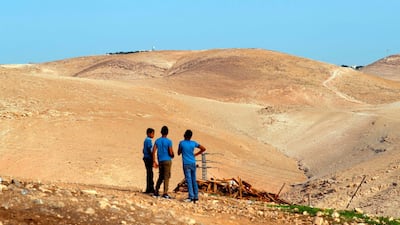Israeli forces on Thursday dismantled an encampment set up by Palestinian activists protesting against the impending demolition of a nearby West Bank hamlet.
About 200 soldiers converged on the encampment near Khan Al Ahmar before dawn, dismantled the shacks and carried them away in lorries, protest leader Abdullah Abu Rahmeh told Associated Press. Protesters chanted "Out, out, terrorist army" as the trucks and soldiers left after daybreak.
Israel's Supreme Court last week rejected an appeal against the demolition of Khan Al Amar, paving the way for the village to be razed. A temporary stay against the demolition expired on Wednesday, meaning that the army can now implement the court order as and when they see fit.
The court's decision brought to an end a nearly 10-year legal dispute. Israel says Khan Al Ahmar was built illegally and in an unsafe location near a major motorway, and has offered to resettle the 180 or so residents 12 kilometres away. But Palestinians say it is impossible to obtain Israeli building permits and the demolition is meant to make room for the expansion of a nearby Israeli settlement.
On Monday, Britain, France, Germany, Italy and Spain issued a renewed call for Israel not to demolish the village, warning of the consequences for residents as well as "the prospects of the two-state solution".
________________
Read more:
Palestinians file ICC war crimes complaint over Israeli demolition plans
Israel demolishes family home of Palestinian attacker
________________
Khan Al Ahmar is in the 60 per cent of the West Bank known as Area C, which remains under exclusive Israeli control and is home to dozens of Israeli settlements. Israel places severe restrictions on Palestinian development there and home demolitions are not unusual. But the removal of an entire community would be extremely unusual.
In rare cases, Israel has also evicted Jewish settlers who have squatted illegally. But settlers generally have a much easier time receiving building permits, and the government often retroactively legalises unauthorised outposts, looks the other way or offers compensation to uprooted settlers.
As part of interim peace deals in the 1990s, the West Bank was carved up into autonomous and semi-autonomous Palestinian areas, known as Areas A and B, and Area C, which is home to some 400,000 Israeli settlers.
The Palestinians claim all of the West Bank and say that Area C, home to an estimated 150,000 to 200,000 Palestinians, is crucial to the economic development of their future state, which would also include the Gaza Strip on the Mediterranean coast.
Israel on Thursday reopened the only exit point for residents of Gaza, more than a week after shutting it following a destructive Palestinian protest.
The reopening follows several days of relative calm, as Egyptian and UN officials attempt to broker a long-term truce between Israel and Gaza's Islamist rulers Hamas.
The Israeli army said hundreds of "rioters" had vandalised the Gaza side of the crossing on September 5, and that it would remain closed until the damage was repaired.
Israel has enforced an air, land and sea blockade on Gaza for more than a decade, but grants permission to a limited number of people to cross. An average of about 1,000 Gazans cross through Erez each day, mostly those in need of medical care, but also businesspeople, students and others, Israeli authorities say.
A second crossing with Israel, Kerem Shalom, is for goods only.

